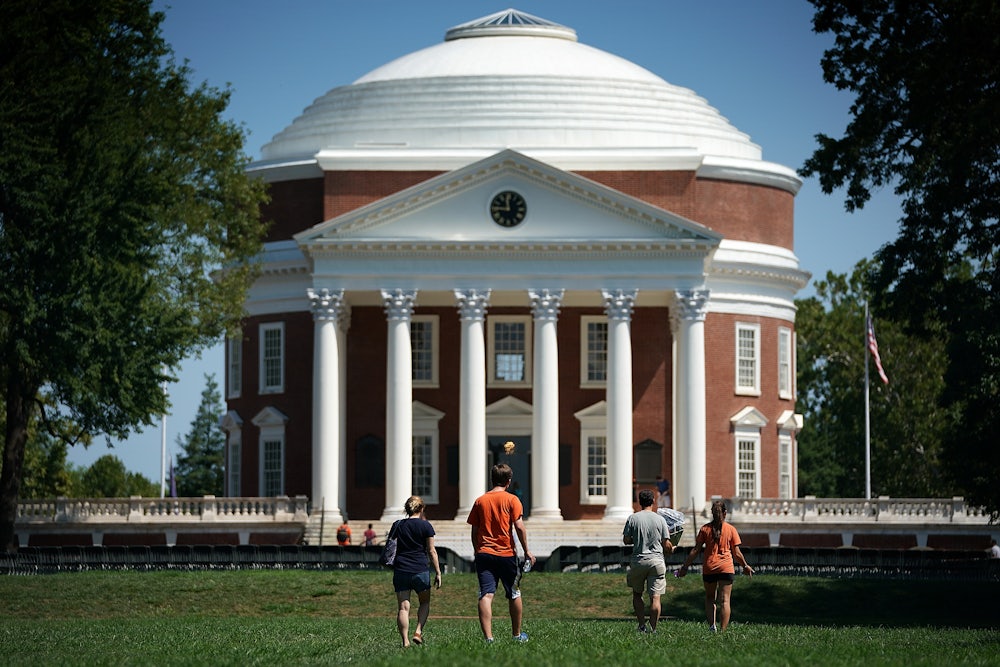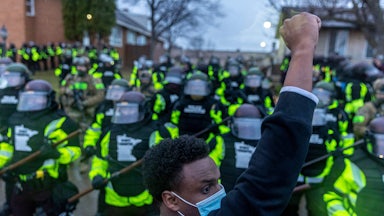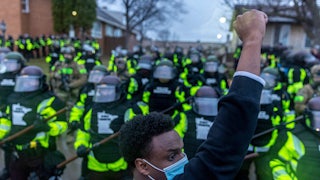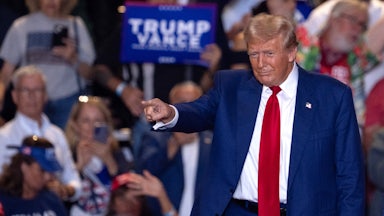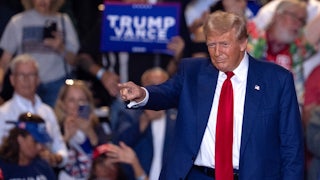Virginia’s Republican Party is a mess. The once reliably reddish commonwealth has grown steadily bluer in recent years, thanks in no small part to the growth that the Washington, D.C., suburbs have experienced over the last decade. Democrats control the state legislature for the first time in a generation and have won the last two gubernatorial elections. Joe Biden won the state by nearly 10 points, doubling Hillary Clinton’s margin of victory in 2016.
Despite the fact that the landscape is swiftly tilting in a more liberal direction, Virginia’s GOP is running at a full sprint toward Trumpism, embracing the Big Lie; the party’s gubernatorial primary was essentially a statewide competition to determine who could put on the most craven display of devotion to Dear Leader. While the eventual nominee, wealthy former private equity executive Glenn Youngkin, failed to top the flamboyant Trump worship of state senator and self-proclaimed “Trump in heels” Amanda Chase—who referred to the January 6 insurrectionists as “patriots”—he has managed to secure the former president’s repeated endorsements. He currently trails Democratic nominee Terry McAuliffe in the polls.
So what is Virginia’s Republican Party doing to bolster Youngkin’s chances? Picking a silly fight with a university over anti-Trump tweets from one of its professors, that’s what.
Last week, Virginia Republican Party Chairman Rich Anderson wrote a letter to the University of Virginia, demanding an ethics investigation into Larry Sabato, the longtime director of the university’s Center for Politics. Several of the tweets Anderson cited opined that Donald Trump is mentally unbalanced or has “governed on the edge of insanity.” Many others are purely unalloyed fact. One notes, “It is impossible to have an orderly, productive exchange with Donald Trump,” a noncontroversial observation that has been borne out time and time again. Another correctly notes that “it is a disgrace that Trump became the first major-party presidential candidate since the 1970s to avoid releasing his tax returns.”
There is nothing particularly shocking or off-putting about any of these tweets. Nearly all of them, as New York’s Jonathan Chait wrote last week, resemble “the kinds of things Republicans—including Republicans nominated by Trump and working closely at his side—say about Trump all the time,” albeit anonymously. If Trump’s own aides continually attest, again and again for four years, that the guy is nuts, how can you ding a political science professor for saying the same thing from his personal account?
Anderson doesn’t seem to know the answer. He writes that he understands “the commitment that public servants make to serving with integrity, dignity, respect, and honor in their taxpayer-funded roles” and notes that the mission of the university’s Center for Politics states, “Everything we do must fulfill our goal of instilling citizens with an appreciation for the core values of American freedom, justice, equality, civility, and service.” Criticizing Donald Trump’s assault on democracy fulfills that mission—indeed, suppressing criticism of it would quite clearly be a betrayal of the mission of both the University of Virginia and its Center for Politics.
“It’s about intimidation—and not of me,” Sabato told The New Republic. “I’m pushing 70. I’ve been here for over 50 years, if you count my student days. I’ve got job security and a lot of supporters. There’s nothing they can do to me. What they do by attacking me is to send a message to more vulnerable junior faculty and others: This is what’s going to happen to you if you dare speak out or you say things that we don’t like. That’s what it’s all about. They know that, I know that.” Targeting Sabato, a venerable figure in Virginia politics who has hardly demonstrated a propensity toward partisan bomb-throwing or radical beliefs, sends a message to less-prominent figures at public institutions: Step out of line, and we’ll come for you.
If the leader of the state Republican Party is willing to pick a fight over tweets about tax returns and debate etiquette, you can only imagine the response to something even slightly spicier. With the gubernatorial race tight, the message is chilling: If Virginia’s Republicans take back power in the state, its educators better watch out. “One of the functions of academics at a university is to speak truth to power,” Sabato told me. “If we can’t do that, we aren’t really fulfilling our bargain with society.” The point of these fake controversies is to muzzle academics and stifle speech—ironically, or perhaps disingenuously, in the name of protecting free speech.
Naturally, Anderson’s actions are par for the course with a Republican Party that’s abandoned any interest in governing as it steers into its larger drunken bender with cultural grievances. Think, for instance, of the coverage on the right of 1619 Project author Nikole Hannah-Jones, who was recently denied tenure at the University of North Carolina. (She was later offered tenure but chose to work elsewhere.) Last week, Tennessee Representative Mark Green demanded in The Washington Post that the Air Force Academy fire a professor for defending the teaching of critical race theory.
Their devotion to the culture war has extended into academia, public education, and public health: Republicans in Tennessee this week have clamped down on the state’s public health officials’ efforts to promote vaccinations to the young, just as the perils of the Covid-19 delta variant are mounting.
The GOP is well known for caricaturing universities as hotbeds of radicalism and indoctrination, as a way of keeping its voters engaged and paranoid. Nevertheless, we’re likely to get treated to a more heaping portion of this sort of rhetoric as the party turns its attention to the midterms. “Once they’ve demonstrated the power to generate a controversy,” Sabato told me, “they’re going to repeat the practice.” Bereft of any substantive policies to offer, this might be the Republican Party’s only move.
